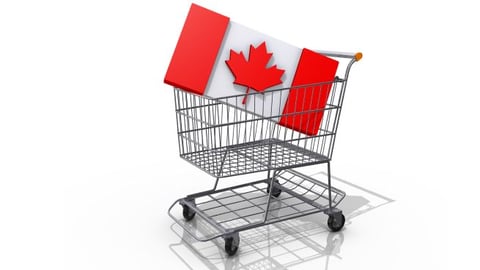Metro CEO says tariff impact minimal so far, grocer in ‘wait and see mode’
Metro Inc. president and CEO Eric La Flèche said the food and pharmacy retailer hasn’t been dealt a significant blow by the U.S.-Canada trade war.
But that could change next week. On April 2, U.S. President Donald Trump is set to impose so-called “reciprocal tariffs” on American trading partners. Ottawa has said it will apply counter tariffs on additional imports from the U.S. in response.
At the CIBC Retail and Consumer Conference, held in Toronto on Wednesday (March 26), La Flèche said the company is in “wait and see” mode.
“The tariffs, or the counter-tariffs, to be more precise, have not had a real impact at shelf on pricing to date,” he said. “We might be assuming a piece of it, but it’s on a very limited number of skews so far. We will see what is going to play out next week. Like everybody else, we’re in a ‘wait and see’ mode.”
La Flèche said Metro—whose banners include Metro, Super C, Food Basics and Jean Coutu—sources around 10% of its products from the U.S.
“We will monitor closely and adjust our merchandising closely, and promote or source from other countries as much as we can. But there could be some price increases after April 2.”
La Flèche said Metro’s vendors must provide six weeks’ notice for any price increases.
“During those six weeks, we are actively trying to come to solutions. For the products that are already subject to counter-tariffs, we've received some of these potential increases,” he said, noting most of Metro’s vendors are working to mitigate impacts of the trade war on prices.
“They need to provide us with a specific code on the government list of why this product or that ingredient or that package—or whatever it is—is impacting their cost structure… they have to ‘prove’ the tariff aspect, and then we sit down with them and work out a solution.”
READ: Uncertainty surrounding tariffs remains. What can grocers do?
La Flèche said the “tariff noise” is influencing consumer behaviour.
Shoppers continue their search for value at the grocery store, but many are now also boycotting U.S. products amid a surge of patriotism.
“We're responding to that customer demand by tagging the products at shelf, in our flyer, on our website, helping them make the choices they want to make,” La Flèche said. “We're seeing some increase in the sale of Canadian- or Quebec-based products.”
But the CEO said it’s too early to say whether Canadians are taking the movement further by ditching U.S. retailers.
“We're a proud Canadian company—Canadian-based, Canadian-owned, Canadian-operated. So, we'll see how customers do their shopping… We haven't seen a huge increase in traffic because of the noise that we all read about and the anxiety that everybody's going through.”
La Flèche pointed out that the grocery industry is more sheltered than other sectors in times of economic anxiety.
“Clearly the consumer is saying that they feel anxious and that their confidence level is lower. That can bode well for our sector. In that type of potential recessionary environment, food at home historically has done better, so we're well positioned for that. Again, it's uncertain. We'll just have to see.”
More comments from Metro president and CEO Eric La Flèche:
On square footage growth:
“We look at it market by market, town by town, neighborhood by neighborhood, to see if there's an opportunity for us for food and pharmacy. There's more opportunity for us on the food side in both of our markets, especially on the discount side… We see more opportunity to grow discount in Quebec. In Ontario, we have a great banner in Food Basics—doing well in the market, has gained share over the last few years, and doing well in new markets for us— smaller towns, rural sites—and we look to do more of that in ‘25 and the next few years.
“The big impact on square footage is the conversion, or the substantial conversion, of conventional stores to discount in the province of Quebec by one of our competitors. Some 70 stores over three years have converted, so it has changed the market. Sometimes we get hit a little bit, sometimes we get hit a little less, and then we recoup and grow again. Net, it's been a manageable impact over the last three years.”
On the Grocery Code of Conduct:
“The biggest change is going to be transparency in discussions between retailers and vendors... It's not going to change the way we do business. It's not going to do anything for inflation or pricing in general. It just should make for more transparent relations… Our behaviour is as per the code and has been historically. So we don't see a big change in our practice, and we're looking forward to this thing being implemented and in effect. Hopefully June of this year, date, but I don't have a full confirmation yet.”




